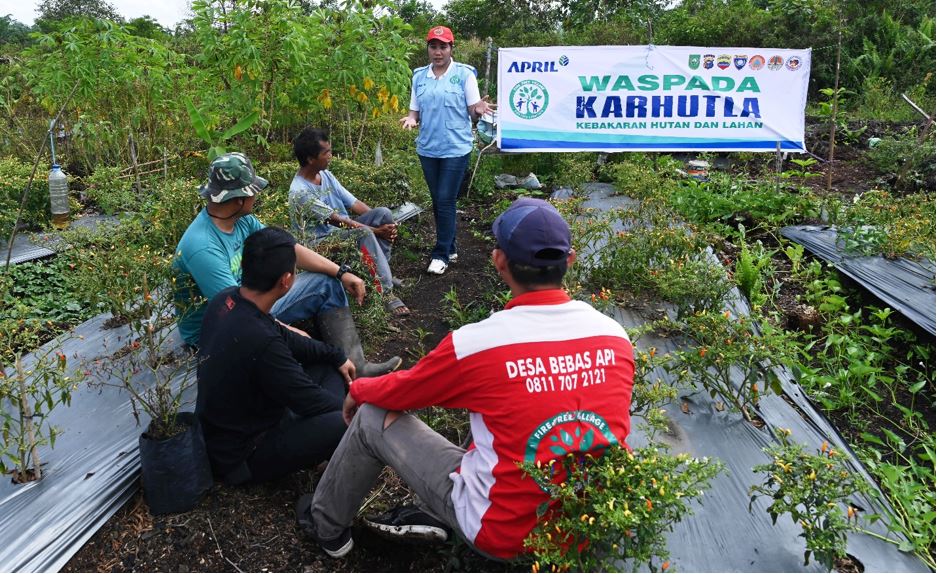APRIL Intensifies Fire Prevention Measures to Prepare for Drier-than-Average Dry Season
The Indonesian Meteorology, Climatology, and Geophysics Agency and Australian Bureau of Meteorology have officially declared an El Niño and a positive Indian Ocean Dipole, both of which are caused by temperature changes in the Pacific and Indian oceans, respectively. These phenomena are occurring simultaneously during this year’s dry season, which is likely to bring hotter and drier weather across the Region for the remainder of the year.
APRIL has been on high alert since the approach of the dry season and continues to ramp up measures under its fire prevention and management programme to mitigate the risks of fires in its concession areas in Riau, and to support the government and local communities.
APRIL has a strict “No Burn” policy since 1993 and introduced the Fire Danger Period – a voluntarily declared Fire Danger Period every July to September across its concession areas and supply partners in Riau Province. It is designed to raise awareness and widely communicate that the current climatic conditions are unsafe for any burning activities. This is now a standard operating procedure for APRIL every year.

With the increased risk this year, APRIL is intensifying its communication efforts with employees and local communities, increasing collaboration with stakeholders, and further strengthening its internal fire management.
A key pillar of APRIL’s fire management initiative is its Fire Free Village Programme (FFVP), a community engagement program that has received positive feedback from the communities, peers, and the government since its inception in 2015. Over nearly a decade, the program has affected a strong behavioral change, reducing the area lost to fire by more than 90 per cent compared to pre-program levels, spanning 902,872 hectares across Riau Province.
In each FFVP village, a fire crew leader is recruited and trained to build awareness of the risk of fires and to encourage behavioral change through constant communication with the communities. This year, the crew leaders are more active than usual, intensifying their awareness-raising campaign by engaging people directly in communal and other public areas.
The crew leaders this year are also required to share information such as the Daily Fire Danger rating and any other fire risks with APRIL’s fire team via a WhatsApp group to ensure immediate deployment of assistance in any of the Fire Free villages.
Within its operations, APRIL is also increasing its fire awareness activities for contractors and estate workers to ensure that they are vigilant to any fire risks. Our fire management team based in the estates are diligently reminding these contractors and workers through other internal communications means to ensure the message is delivered across.
Internal Fire Management Measures
APRIL has in place a multi-pronged approach that includes:
- Company-wide fire prevention mindset: APRIL has instilled a fire prevention mindset throughout the company, with all employees trained both on fire prevention and suppression procedures.
- Deployment of the latest satellite and monitoring technologies: APRIL uses the latest satellite and monitoring technologies to detect and track fires early on.
- On-the-ground vigilance: APRIL has a team of ground patrols that monitor for fires and potential fire threats.
APRIL’s fire prevention experts layer prevention strategies, ground patrols, and remote sensing technology to hone in on fires, or their makings, often hours before they appear as hotspots by satellites, which can take up to 12 hours to complete an orbit.
While satellite remote sensing provides early detection of potential flare-ups, they can mistake reflective pools, mosque roofs, and other reflective surfaces for small blazes or hotspots. Therefore, APRIL relies on its ground team to check for all hotspots that carry potential fire threats and report them to local authorities.
To enhance coordination, each ground team is equipped with a GPS. This helps to mobilize the nearest crew to ground-truth potential hotspots or dispatch first responders if there is any fire. Local regulations require hotspots to be investigated, and the cause of the alert to be logged with law enforcement, including the location’s GPS coordinates. Ground teams aim to arrive on the site of a hotspot within 15 minutes.
These efforts are complemented by bi-weekly risk mapping, extending 3 kilometers beyond APRIL and its suppliers’ concession areas. This allows fire prevention teams to identify and monitor areas that experience potential increases in fire risks, usually due to land clearing for agricultural activity.
Collaboration with Stakeholders
Besides internal prevention measures, APRIL is also working closely with the Pelalawan Fire Working Group Cluster (PFWGC) – a cross-company working group setup by the local government in collaboration with the United Nations Environment Programme (UNEP).
The PFWGC led by the government, includes more than 80 companies that manage and operate industrial forest plantations and/or agricultural plantations in the regency where it works closely with its members to implement a cluster-based fire management program to ensure more coordinated fire prevention and suppression efforts. APRIL’s fire prevention approach is shared with participating companies.
APRIL is also working with companies and NGOs under the Fire-Free Alliance (FFA). Understanding the heightened fire risk this year, all FFA members convened in June to have a better look and assessment of how serious this year’s fire risk could be. The alliance has recently published a series of case studies from FFA members’ experiences for others to learn and adopt where necessary. FFA members include Sime Darby, Musim Mas, and IDH (The Sustainable Trade Initiative)




